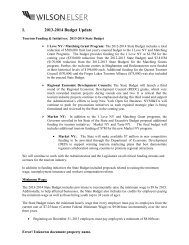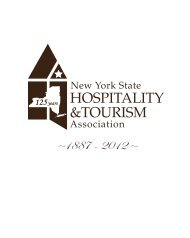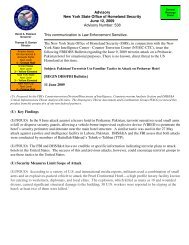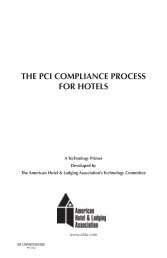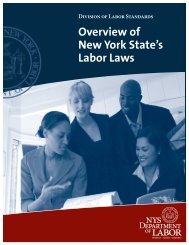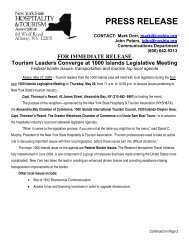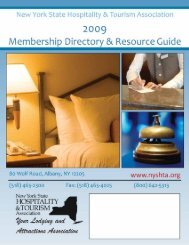2012 - New York State Hospitality & Tourism Association
2012 - New York State Hospitality & Tourism Association
2012 - New York State Hospitality & Tourism Association
You also want an ePaper? Increase the reach of your titles
YUMPU automatically turns print PDFs into web optimized ePapers that Google loves.
Why Hoteliers Need To Be Proactive<br />
To Comply with OSHA Standards<br />
Industry <strong>New</strong>s<br />
The Occupational<br />
Safety<br />
& Health Administration<br />
(OSHA) is<br />
the U.S. governmental<br />
agency with the responsibility<br />
to enforce Workplace<br />
Safety & Health<br />
Standards. OSHA inspects<br />
workplaces to<br />
By Joel Paradee,<br />
ensure compliance<br />
G.C.G. Risk Management<br />
with these standards.<br />
Employers in violation<br />
can receive fines, timelines for when hazards must be<br />
fixed, and in large cases, OSHA may send a press release<br />
about the results, creating bad public relations for<br />
your business.<br />
Preparation is Key<br />
While a hotel or resort may not be on the list of “High<br />
Hazard Industries”, hotels are inspected at the rate of<br />
nearly one per day throughout the country, and many<br />
have been given expensive fines that could be avoided<br />
with proper planning.<br />
• Ensure your OSHA Recordkeeping Forms are<br />
up-to-date and accurate within 7 days.<br />
• Create or maintain a Safety Committee to discuss<br />
safety issues at your Hotel.<br />
• Create a plan for receiving an OSHA Inspector<br />
and drill occasionally.<br />
• Work with Safety &<br />
Insurance Professionals to<br />
conduct preemptive mock<br />
inspections to identify<br />
potential violations before<br />
OSHA arrives.<br />
Inspection Tips<br />
Allow the OSHA Inspector to<br />
conduct the inspection properly.<br />
You have the right to ask the<br />
inspector for a warrant, but statistically<br />
in such cases it results in<br />
more violations and higher fines.<br />
The inspector will have an opening<br />
conference with management<br />
and any union representatives to<br />
explain the process and their “Scope of Inspection”.<br />
The Scope of Inspection includes the reason they have<br />
arrived, and what specific areas they plan to inspect.<br />
This limits the inspection to just these areas unless there<br />
is “due cause” to expand it.<br />
Take pictures of alleged violations and keep notes.<br />
Just because an OSHA Inspector thinks something is<br />
a violation, doesn’t mean that it is. Your notes and pictures<br />
can be valuable when disputing violations in your<br />
defense later on.<br />
Receiving Citations<br />
If you receive citations, there is a 15-day period in<br />
which you are allowed to contest citations you feel are<br />
inaccurate, have excessive penalties, or the timeline to<br />
fix the issue is too short.<br />
Many of these issues can be discussed during an Informal<br />
Conference. During this informal conference,<br />
you may come to an agreement with OSHA that works<br />
for both parties. Attempt this early in the 15-day time<br />
frame to allow time to contest properly if an agreement<br />
cannot be reached.<br />
Don’t pay retail. There are a number of adjustments<br />
that can be made to reduce the total cost of citations<br />
such as; Good Faith, Size of Business, History of Violations,<br />
and Gravity of Violations.<br />
Joel Paradee is a Safety Consultant for G.C.G. Risk Management<br />
Inc. and regularly performs loss control inspections. For more<br />
information on OSHA standards and procedures, contact Joel at<br />
joel.paradee@gcgriskmanagement.com.<br />
FOCUS Fall/Winter <strong>2012</strong> | 21



